What does accomplished teaching look like? Does being accomplished mean that you are also distinguished? Are these terms synonymous with one another?
 I will admit it- I don’t mind our new state teacher evaluation system TPEP. In fact, I jumped on the TPEP bandwagon fairly early. Analyzing my teaching and reflecting upon my effectiveness has been a part of my practice for many years. I certified as a National Board Certified Teacher in 2005 and renewed two years ago. Having facilitated several cohorts of teachers through the process, I can attest to the planning, engagement, and reflection involved in seeking National Board Certification. Those same skills and practices are echoed and assessed in the TPEP process.
I will admit it- I don’t mind our new state teacher evaluation system TPEP. In fact, I jumped on the TPEP bandwagon fairly early. Analyzing my teaching and reflecting upon my effectiveness has been a part of my practice for many years. I certified as a National Board Certified Teacher in 2005 and renewed two years ago. Having facilitated several cohorts of teachers through the process, I can attest to the planning, engagement, and reflection involved in seeking National Board Certification. Those same skills and practices are echoed and assessed in the TPEP process.
With the amount of work and documentation involved in TPEP, it seems like a no brainier to support HB 1319, a bill, if enacted, would allow National Board Certified Teachers the ability to complete the comprehensive evaluation once every six years if the teacher received a rating of 3–Proficient on his/her last comprehensive evaluation, and once every eight years if the teacher received a rating of 4-Distinguished on his/her last comprehensive evaluation. The time is right for this piece of legislation. Now that the National Board Certification renewal process is every five years instead of ten, it strikes me that attainment of renewal will clearly demonstrate that the National Board Certified Teacher is, at the very least, proficient, if not distinguished. Last year, a similar bill was introduced into the House and ended up in the “x” file. I still can’t understand how this happened as the bill had no cost associated with it, but I am glad to see a similar version this year as it will balance the logistical challenges associated with the teacher evaluation system by supporting focused, more meaningful conversations on one area of teaching and learning versus eight.
When TPEP was rolled out to teachers and administrators, we all knew that the evaluation system was going to change. What we didn’t know was just how much work it would be. Again, I like TPEP. I enjoy the conversations that I am having with my administrators about what teaching and learning looks like in my room. I’ve been on the focused evaluation form for the past three years. Admittedly, I enjoy the focused reflective and analytical conversations about what is going on in my room. I am thankful that the workload is reduced to evidencing one criterion and collecting evidence for one student growth goal (sub group or large group). When I was on the comprehensive form I needed 24 artifacts (eight criteria and a minimum of three artifacts per criteria) and had to write and collect evidence for two student growth goals. I work at a relatively small high school with a principal and an assistant principal. We have around 40 teachers in our school, which means that each administrator is responsible for roughly 20 evaluations. We embraced TPEP with a growth model mindset–teachers on Comprehensive meet every 2-3 weeks with our administrators to discuss artifacts and document evidence/progress towards the evaluations. Teachers on Focused meet, at minimum, every 6-8 weeks to do the same. These meetings take 30-50 minutes each time if both parties are well prepared. While I know that not all schools and administrators use this model, I also see the value in this process.
For the past two years, I’ve also worked as a part time instructional coach–largely working collaboratively with teachers to provide evidence of the criterion and develop high quality, measurable student growth goals. Now there are three of us (my principal, assistant principal, and me) doing routine observations, meeting with teachers to reflect, and working on evidencing the criterion. My work as a coach has cut down on their work but admittedly, the position was created from a need of helping both teachers and administrators manage TPEP. However, with more teachers on Focused, my coaching has been less about evidencing a TPEP criterion and more about analyzing and reflecting upon quality teaching and learning. This is where I’ve seen leaps and bounds in our professional development as a staff. Teachers on Focused are now visiting one another’s classrooms both through the use of the Observe Me signs and through the use of a Pineapple Calendar (Pineapple Calendar’s are a way to invite colleagues into your room to observe a specific lesson). With the vast majority of our staff on Focused, teachers are participating in book studies of choice, engaging in criterion centered PLCs, and spending lunch periods talking about teaching and learning. Our culture grows organically because teachers have more agency in their evaluation system and can therefore dig deeper into areas of interest and need.
The passage of HB 1319 demonstrates continued support and value for second tier certifications such as National Board Certification. National Board Certified Teachers have already demonstrated that they are accomplished, now let them engage in thoughtful, purposeful analysis centered on one area of teaching, instead of eight. This bill helps administrators with the log jam that the comprehensive evaluation creates. Washington currently has over 6000 NBCTs. Passage of this bill directly impacts how and when administrators schedule comprehensive evaluations. HB 1319 allows administrators to spread out the number of comprehensive evaluations over a longer time period. I hear from other admin in neighboring districts that they simply don’t have the time to manage TPEP, all of its artifacts, and regularly scheduled face to face meetings with all of their teacher. HB 1319’s commonsense approach offers an opportunity for teachers to deeply engage in the evaluation criterion while clearing up the evaluation congestion for administrators.
 Last month we had an incredible event. Nearly 100 NBCTs met to talk about how to preserve the National Board bonus in Washington State. My role was interesting; I got to monitor the conversations at seven different tables and glean the common, high-leverage ideas that emerged. What I learned was this:
Last month we had an incredible event. Nearly 100 NBCTs met to talk about how to preserve the National Board bonus in Washington State. My role was interesting; I got to monitor the conversations at seven different tables and glean the common, high-leverage ideas that emerged. What I learned was this: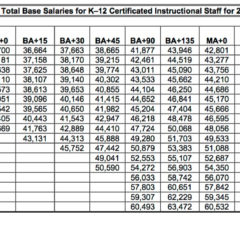
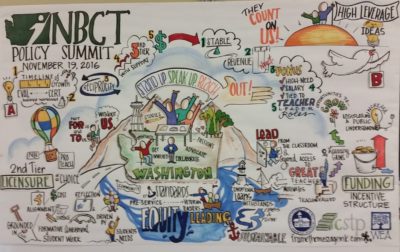
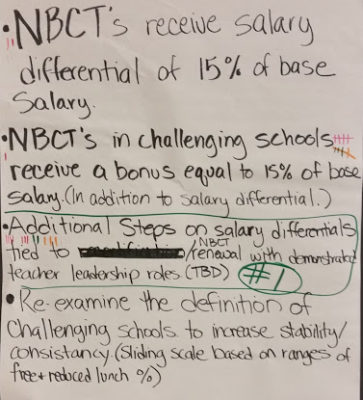
 My youngest son recently announced he was thinking about becoming a teacher. “What are all the steps you have to go through?” he asked.
My youngest son recently announced he was thinking about becoming a teacher. “What are all the steps you have to go through?” he asked.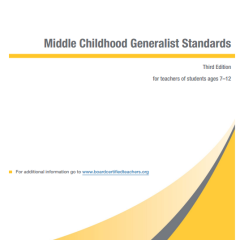 I recently celebrated my 30th wedding anniversary, and as it happened, my wife and I attended a wedding three days later. While watching the wedding my thoughts naturally turned to the differences between a wedding and a marriage. It’s one thing to promise everything to your spouse; it’s another thing altogether to renew that promise year in and year out.
I recently celebrated my 30th wedding anniversary, and as it happened, my wife and I attended a wedding three days later. While watching the wedding my thoughts naturally turned to the differences between a wedding and a marriage. It’s one thing to promise everything to your spouse; it’s another thing altogether to renew that promise year in and year out.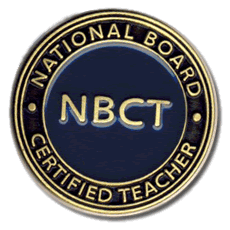 By Tom
By Tom
